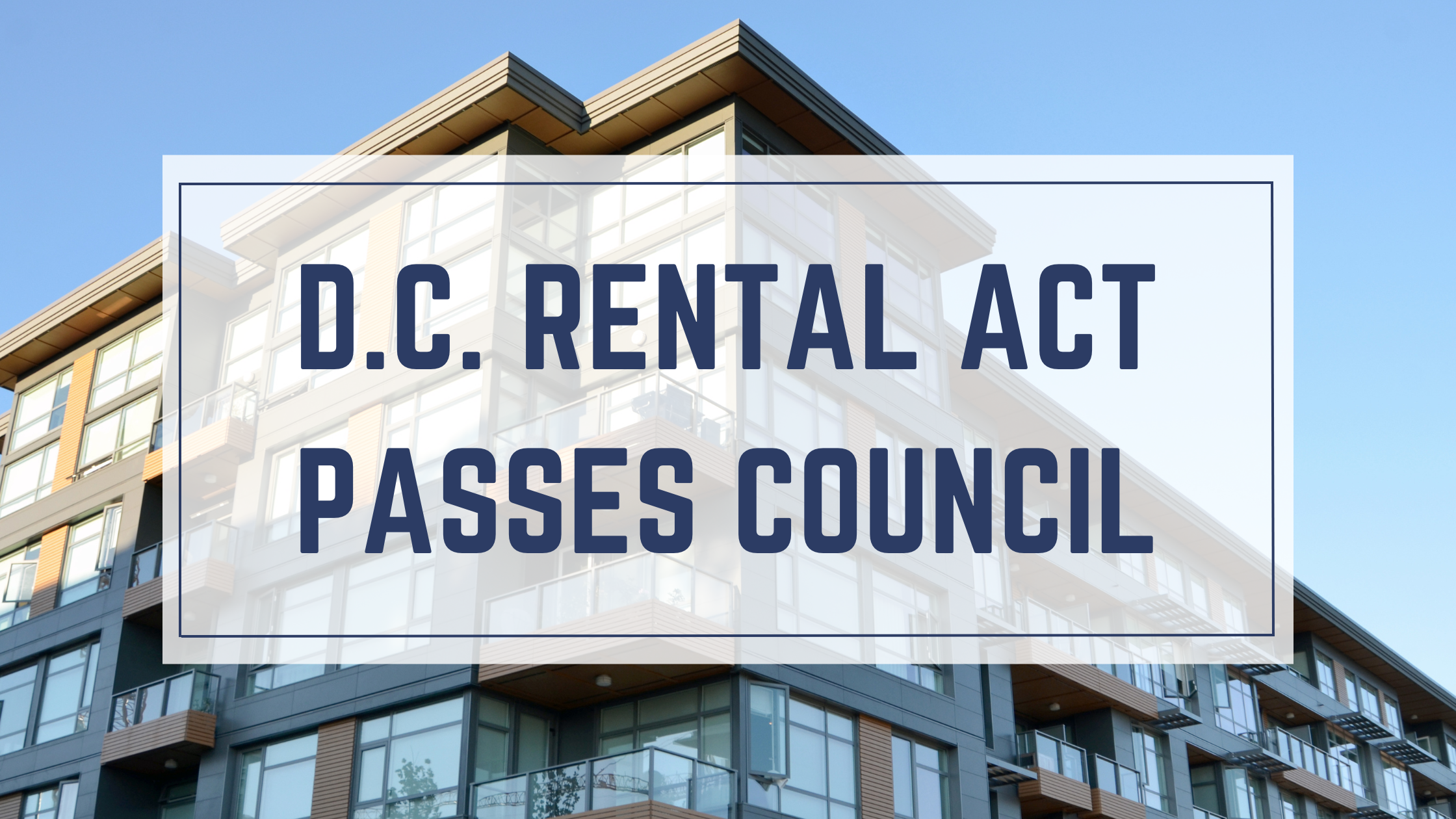The D.C. Council passed the Rebalancing Expectations for Neighbors, Tenants, and Landlords Act, or RENTAL Act, on September 17, 2025. This legislation aims to address the ongoing challenges within D.C.’s housing market, including how eviction cases are managed, how the Tenant Opportunity to Purchase Act (TOPA) operates, and how affordable housing providers can maintain financial stability.
In this post, I’ll walk through: what it changes; why it was proposed; who supports and who opposes; and what it means for different stakeholders (tenants, landlords, developers, the city).
The Key Changes Brought by the RENTAL Act
As a sweeping legislative change, this act affects the entirety of the D.C. housing market. Here are the most impactful reforms and how they work:
Exemptions under TOPA:
The RENTAL Act modifies the framework under the Tenant Opportunity to Purchase Act (TOPA) that when certain rental buildings go up for sale, tenants have a right of first refusal or the ability to find a buyer aligned with their interests.
- A new construction exemption: Buildings newly constructed (initially, the proposal was 25 years; the final bill set the exemption at 15 years) are exempt from TOPA for that initial period.
- Exemptions for smaller rental accommodations: The law, as amended, exempts buildings with four or fewer units from TOPA under certain circumstances.
- A “cooling off” period: Under the changes, when tenants are given a notice of sale under TOPA, there must be a 45-day period during which rights cannot be assigned until tenants meet with a tenant-support provider.
Supporters of the changes believe these modifications may reduce barriers to investment and new housing development, while opponents warn that easing TOPA rules could weaken tenant influence during property sales.
Evictions and “One-Strike” Provisions
Another set of important changes relates to evictions and the route by which landlords can regain possession of units.
- The notice period for evictions (in many cases) is shortened from 30 days to 10 days in the case of alleged criminal activity or violent crime in the unit or on the premises.
- The law also clarifies that if the tenant is the victim of a violent crime in the unit, the eviction clause cannot be triggered by that fact.
- There are concerns that the language may enable what some tenant advocates call a “one-strike” policy: eviction triggered by mere arrest or allegation rather than conviction.
Definitions and Clarifications
The Act also includes changes to how “tenant” and “owner” are defined for the purposes of the law. For example, accommodating situations where there may not be a formal written lease, but the occupant is still recognized as a tenant.
Why the change?
During the pandemic, D.C. implemented some of the strongest tenant protections in the nation, including a broad eviction moratorium and rent-relief programs designed to keep residents housed during a time of crisis. While these measures offered essential stability for renters, they also created ripple effects across the housing ecosystem, leading to mounting rent arrears, cash-flow shortages, and operational challenges for property owners and managers. Affordable-housing providers, in particular, sounded the alarm that many of their buildings were becoming financially distressed, warning that without the ability to cover expenses or recover unpaid rent, they faced the risk of foreclosure or conversion, jeopardizing the very stock of affordable units the city has worked so hard to preserve. At the same time, new housing production in D.C. continued to trail behind neighboring jurisdictions, as developers cited regulatory hurdles and uncertainty as major deterrents to building new multifamily projects. This confluence of financial strain, policy rigidity, and slowed development set the stage for the comprehensive set of reforms introduced under the RENTAL Act.
So why now?
Supporters of the RENTAL Act argue that without reform, the city will continue to see:
- Shrinking affordable housing supply
- Developers and investors being deterred by regulatory risk
- Landlords holding off on improvements or selling off rental housing
- Affordability worsening over time as supply tightens
Thus, the legislation was framed as pragmatic and necessary to protect both the existing housing ecosystem and to allow future growth.
What does this now mean for different stakeholders?
For Tenants
- Exemption from TOPA (with exceptions): If you live in a building constructed in the last 15 years, or ≤ 4 units under certain circumstances, your right under TOPA to purchase or otherwise influence a sale might not apply.
- Shorter Eviction Notice: For certain circumstances involving violence or crime allegations, eviction notices may be shorter (10 days). This raises concern about tenant stability.
- Tenant definitions clarified: Good news in some ways. If you don’t have a formal lease, the law clarifies you may still count as a “tenant” for certain protections
- Uncertainty about long-term protections: Because the law changes longstanding rights, some tenants feel more vulnerable, especially in buildings that may change hands or convert.
- Advocacy groups have indicated they will closely monitor implementation to ensure fair enforcement of eviction and purchase rules.
For Landlords and Housing Providers
- The law is expected to provide greater regulatory clarity and may make it more feasible to invest in or maintain rental properties, including affordable units.
- The shorter eviction notice in certain cases may help providers address units where there is serious safety or criminal activity risk more swiftly.
- Exemption of newer properties from TOPA is seen by many as a positive for new housing development and investor interest.
- That said, landlords still must comply with many tenant-protection laws and operate within D.C.’s regulatory ecosystem; this isn’t a full deregulation.
For Developers and the Housing Market
- The law could influence future development, especially multifamily, by reducing one source of regulatory friction
- It may also preserve existing affordable housing by making it financially more viable for providers to operate or convert without facing crippling tenant-purchase obligations or extreme delays.
- On the flip side, some developers will still face community scrutiny, affordability requirements, and other regulatory and funding pressures. The law may shift, but it doesn’t eliminate those.
For the city at large
- If successful, the RENTAL Act could lead to increased housing supply, slow displacement, preserve affordable units and stabilize neighborhoods.
- But there is risk: if protections are weakened too much or if tenant displacement accelerates, the city could face increased housing insecurity, loss of long-term residents, and community destabilization.
- The challenge for policymakers will be balancing investment incentives with protections that preserve resident stability and neighborhood diversity.
Action Steps for Tenants, Landlords, and Developers
With these sweeping changes taking effect, preparation is key. Here’s what each group should focus on:
- Tenants: Educate yourself about your updated rights under TOPA and the eviction process. If your building is being sold or you face eviction, seek legal advice early.
- Landlords: Update your internal policies to comply with the new 10-day eviction timeline and documentation standards. Consider proactive communication with tenants to avoid disputes.
- Developers: Evaluate how the revised TOPA exemptions and eviction rules impact your projects. Partnering with nonprofits may help navigate complex transactions while maintaining community trust.
Frequently Asked Questions
If you’re looking for a simpler breakdown, the following FAQs offer clear, straightforward answers to the most common questions about the RENTAL Act.
1. What is the RENTAL Act?
The RENTAL Act is a new law passed by the D.C. Council to address the city’s housing crisis by reforming eviction processes and tenant rights under TOPA. Its goal is to balance tenant protections with the need to attract new housing investment.
2. How does it change eviction laws in D.C.
The law reduces the eviction notice period to 10 days, allows public safety evictions based on criminal charges, and requires tenants disputing unsafe conditions to pay rent into escrow during legal proceedings.
3. What are the new TOPA rules?
TOPA rights are preserved for buildings with affordability covenants. New buildings are exempt for 15 years, giving developers flexibility while maintaining long-term tenant influence.
4. Why were these reforms necessary?
Years of unpaid rent, lengthy eviction timelines, and declining investment created a housing market on the brink of collapse. The RENTAL Act was designed to stabilize the system and prevent affordable housing loss.
5. How will this impact affordable housing?
By streamlining processes and clarifying rules, the law is expected to attract new investment, preserve existing affordability, and prevent foreclosures that could convert affordable units to market rate.
6. Who supported the RENTAL Act?
Mayor Bowser and Housing Committee Chair Robert White were key proponents, emphasizing the need for bold action to reverse the decline in housing investment.
7. Who opposed it?
Tenant advocates and council members like Janeese Lewis George nd Brianne Nadeau opposed aspects of the law, especially those related to faster eviction timelines.
8. When does the law take effect?
The changes will roll out in phases throughout 2024, with eviction process reforms implemented first.
The passage of the RENTAL Act represents a significant shift in Washington, D.C.’s approach to housing policy, aiming to balance tenant protections with the long-term stability of the city’s rental market. By addressing issues such as financial strain on affordable-housing providers and the slowdown in new construction, the law seeks to create a more predictable and sustainable housing environment. Its effectiveness will depend on careful implementation, transparent enforcement, and ongoing evaluation to ensure that both housing access and investment are supported. Ultimately, the RENTAL Act marks an effort to modernize the District’s housing framework while promoting stability and fairness for all stakeholders involved.
For readers seeking guidance on how the RENTAL Act may impact their property or rental experience, our partner Michels Property Management is an excellent resource. As a boutique residential property management company serving Washington, D.C., Michels Property Management is dedicated to providing exceptional customer service for both owners and tenants. Their team’s local expertise and hands-on approach make them a trusted partner for navigating D.C.’s evolving rental landscape with confidence and care.



